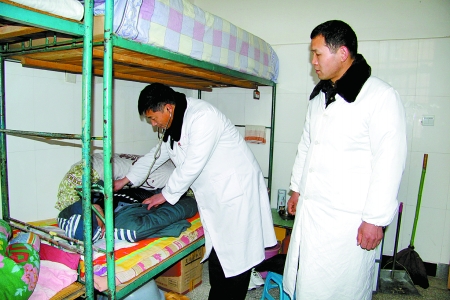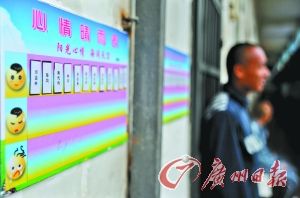|
|||||||||||
 |
|
A medical officer examines an AIDS-infected inmate at Zhoukou Prison, Dec 1, 2011. [Photo/Dahe Daily] |
"Their spit could splash on my face when I talk to them face-to-face," said Chang Xuekui, a medical officer at Zhoukou Prison in Central China's Henan province who checks prisoners with AIDS every day.
Chang and his colleagues visit ill inmates at the prison every day. And in order to gain their trust, they never wear masks or gloves.
"AIDS is not a fatal disease, and we must let them know it," he said.
Chang is only one of the officers working amid AIDS cellblocks in China's prisons.
"Irritable, suspicious, self-abased and desperate - these are the most prominent features of AIDS-infected inmates," said Yang Peifang, an officer at the AIDS zone of Guangdong Women's Prison.
The 41-year-old woman is in charge of 95 prisoners with AIDS and is called "Mother Yang" by the inmates.
Yang took over the first batch of 16 AIDS-infected prisoners in 2005.
Due to their fear of death, some AIDS sufferers vented their emotions with extreme behaviors such as hitting walls, smashing things and attempting suicide. Yang and her colleagues had to cope with difficult situations and build up their confidence to go on with their lives.
"No one dies in prison within the six years," Yang encouraged the inmates.
During her work, Yang also went to local hospitals to learn about AIDS treatment and psychological counseling. The prison also opened medical lectures to improve the officers' professional knowledge of AIDS.
 |
|
An emotional "barometer" hangs outside a cell in Gaoming Prison, Nov 30, 2011. [Photo/Guangzhou Daily] |
To better monitor the mental state of the ill inmates, a board showing their emotional changes is posted outside the cells of Gaoming Prison, in Foshan city, Guangdong province. The board is called emotional "barometer" and prisoners can mark their mood – happy, normal and blue.
"Most of them have suicidal tendencies after losing the most precious things in life- freedom and health," said an officer surnamed Xiang.
With the records on the "barometer", Xiang knows a lot about the inmates' emotional state and can talk with them when there are bad signs.
"Sometimes a conversation can save a life," Xiang said.
Hot Topics
HIV/AIDS, Egypt protest, Thanksgiving, climate change, global economic recovery, home prices, high-speed railways, school bus safety, Libya situation, Weekly photos
Editor's Picks

|

|

|

|

|

|







